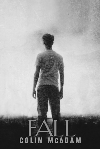
Fall
Colin Mcadam
Penguin Canada
$32
cloth
358pp
978-0-670-06720-6
Noel is actually one or two social-ladder rungs below most of his classmates. His father is a mid-level diplomat able to send his son to a private school only through the special favours his position allows. So when Noel is billeted for his senior year with Julius, son of the American ambassador to Canada, a degree of envy is to be expected. The situation is complicated by the fact that the titular female student who’s the object of Noel’s affections (her name is short for Fallon) is Julius’s girlfriend. Given that Noel is a young man with a budding streak of sadism, and even more prone than most his age to the nursing of delusional hopes and resentments, trouble is all but guaranteed.
The novel’s perspective alternates between that of Noel looking back on events from a decade-later adult vantage and Julius’s in-the-moment, near stream-of-consciousness accounts, most involving his time with Fall. Noel therefore gets to exercise a degree of wisdom while Julius is locked into a world-view not yet fully formed. It’s a gambit on McAdam’s part, risking a skewing of reader sympathy one way or the other, but over the course of the novel the device takes on its own logic. Julius, we come to see, will remain marked by his St. Ebury experience in ways beyond his control. It helps that there are also a handful of short but crucial interludes from the perspective of a chauffeur who works for Julius’s father. William provides a balancing working-class take on the privileged world of the protagonists. McAdam is equally convincing in all three voices, something that won’t surprise readers of his richly hued debut Some Great Thing.
If anything’s missing it’s the voice of Fall herself. For someone at the centre of so much turmoil she’s something of a cipher. Fans of Some Great Thing, where the hard-drinking Kathleen Herlihy was so vividly drawn, may at first be disappointed in this regard, but the new novel’s overwhelming maleness is no doubt part of McAdam’s point. Fall is a novel about how young men process the world; in this case it’s young men in a place whose outdated strictures make the already tangled thicket of late adolescence all the more fraught.
Some may find themselves wondering just how Noel’s background explains the cruel extremes to which he eventually resorts: while hardly idyllic, his life is no more trying than that of countless others who have adjusted far better. In declining to offer any easy explanations – in leaving Noel essentially a mystery, to himself as much as to the reader – McAdam is again taking a chance. But it’s that same sense of risk that makes Fall such a gripping read. Its evil is all the more chilling for its banality.
If there had been any doubt, Colin McAdam has now cemented his place on the list of Canadian novelists who are pushing the form ahead, while keeping it accessible. As a bonus, he has, in tandem with André Alexis, achieved what might once have seemed unthinkable: Canada’s capital is now a setting of glamour and mystery. mRb






0 Comments